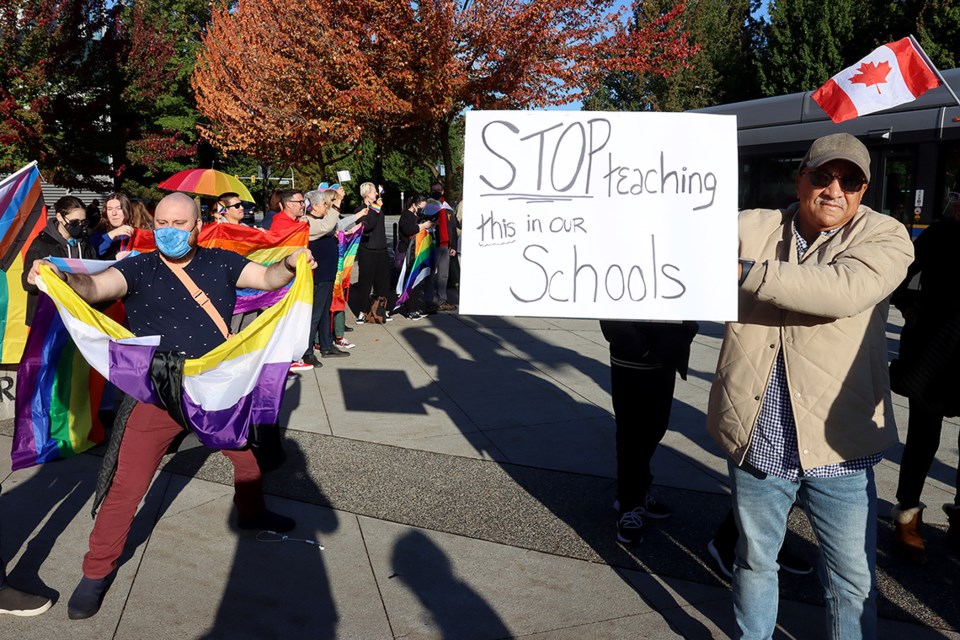Three provinces are scheduled to hold provincial elections this year. In each one of them, discussions about sexual education in schools have received their fair share of media coverage, albeit temporarily.
The provincial governments of New Brunswick and Saskatchewan have already tabled legislation. British Columbia’s case is different, because the ruling BC New Democratic Party (NDP) is not looking to make any significant changes.
The pressure is coming from the opposition. The first question made by Conservative Party of BC Leader John Rustad inside the provincial legislature – at a time when most people expected BC United to be the main challenger to the New Democrats – branded “SOGI-Inclusive Education” as “an assault on parents’ rights.”
This issue, as is often the case with public policy, is not as black and white as both sparring sides would believe. When we asked Canadians last month, almost half (48 per cent) agree to the use of “SOGI-Inclusive Education” in their province, while 31 per cent do not and 21 per cent are undecided.
“SOGI-Inclusive Education” raises awareness of and welcomes students of all sexual orientations, gender identities and family structures. Majorities of residents of Atlantic Canada (54 per cent), Saskatchewan and Manitoba (52 per cent) and Quebec (51 per cent) endorse the use of “SOGI-Inclusive Education.”
The proportions are lower in Ontario (47 per cent), British Columbia (also 47 per cent) and Alberta (44 per cent).
Canadians aged 18-34, who grew up in a world where LGBTQ issues were prominently discussed, are more supportive of “SOGI-Inclusive Education” (53 per cent) than their counterparts aged 35-54 (45 per cent) and aged 55 and over (46 per cent).
Canadians who are parents or guardians of a child aged zero to 12 are more likely to welcome “SOGI-Inclusive Education” in their province (52 per cent) than those with no offspring (47 per cent). Respondents of European descent are less supportive (49 per cent) than those whose origins are South Asian (67 per cent), Indigenous (58 per cent) and East Asian (57 per cent).
Earlier this year, Alberta’s provincial government presented eight policy ideas related to sexual education and gender affirming surgery. In our survey, about three in five Canadians agree with six of them: banning top and bottom surgeries for minors aged 17 and under (66 per cent), banning hormone therapies for gender affirmation and puberty blockers for minors aged 15 and under (61 per cent), compelling schools to advise parents and obtain their consent if a minor aged 15 and under wishes to alter their name or pronouns (60 per cent) and compelling schools to advise parents if a minor aged 16 or 17 wishes to alter their name or pronouns (59 per cent).
We also see majority support for ensuring that parents “opt-in” any minors every time topics such as gender identity, sexual orientation or sexuality are discussed in the classroom (55 per cent, and 61 per cent among parents), and banning transgender women from taking part in women’s sports leagues competitions (54 per cent).
Two other ideas are more contentious. Fewer than half of Canadians agree with the provincial education ministry approving all third-party teaching materials on gender identity, sexual orientation or sexuality that are used in the classroom (48 per cent) and allowing minors aged 16 and 17 to start hormone therapies for gender affirmation if they have the approval of their parents, a physician and a psychologist (45 per cent).
Some Canadians appear worried about the effect that these regulations could have. The notion that parents will be in full control of the way their children learn about sexuality is expected by 48 per cent of Canadians – not exactly a ringing endorsement. More than two in five Canadians (43 per cent) think that medical practitioners (such as doctors and psychologists) will be unable to assess the ethical and medical implications of individual cases if they are restrained by Alberta’s planned legislation.
There are also expectations that, if these proposals become law, gender-diverse youth will be placed at risk (49 per cent) and gender-diverse youth will be unable to seek support from teachers or school staff (43 per cent).
The idea of leaving sexual education as opt-in courses that require parental permission leads more than a third of Canadians to foresee an increase in sexually transmitted infections (40 per cent) and teenage pregnancies (35 per cent).
The results show that Canadians are not looking at sexual education in schools as an “all or nothing” proposition. Some of the proposals make sense to most Canadians – and to parents of children – but others are clearly not universally embraced. Candidates and political parties who choose to focus heavily on an issue that is decidedly contentious are in for a surprise.
Mario Canseco is president of Research Co.
Results are based on an online study conducted from June 8 to June 10, 2024, among 1,001 adults in Canada. The data has been statistically weighted according to Canadian census figures for age, gender and region. The margin of error, which measures sample variability, is +/- 3.1 percentage points, 19 times out of 20.




